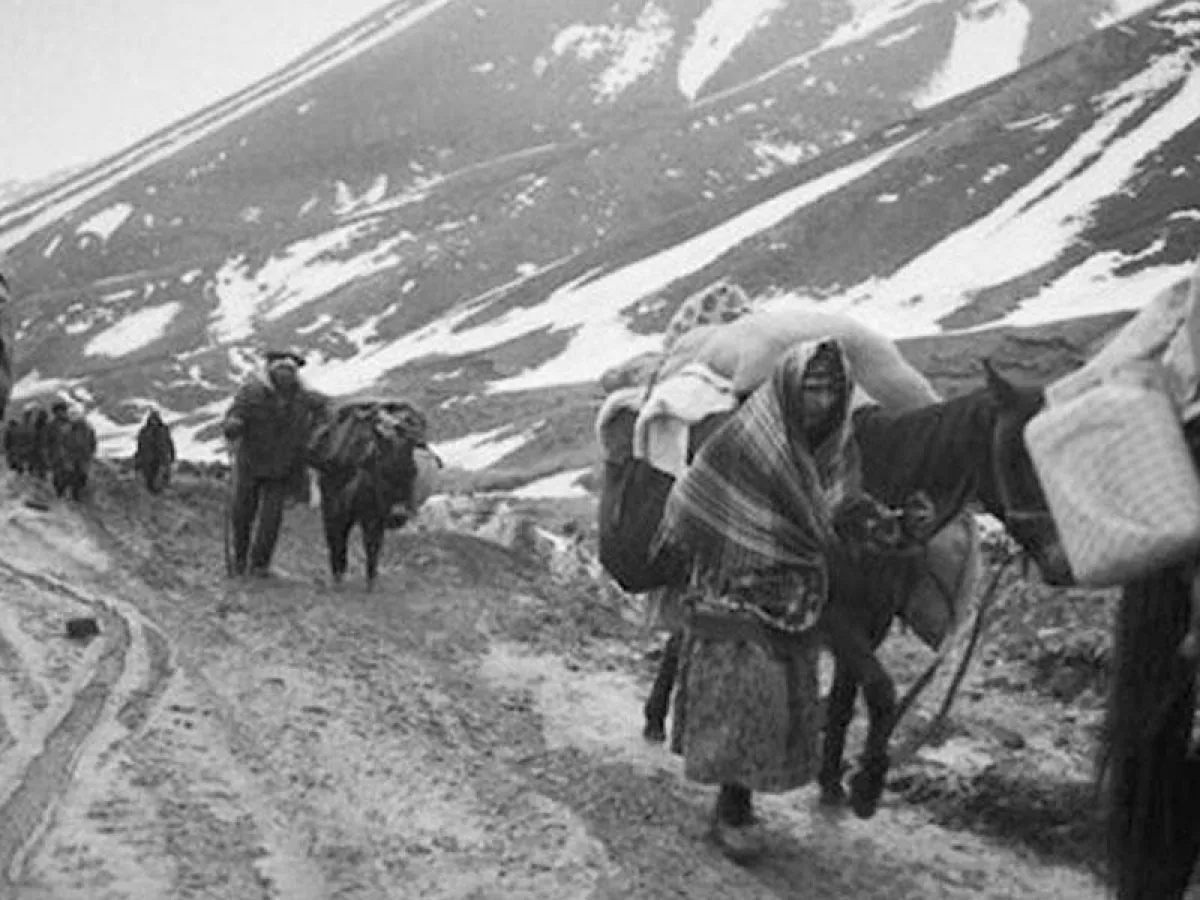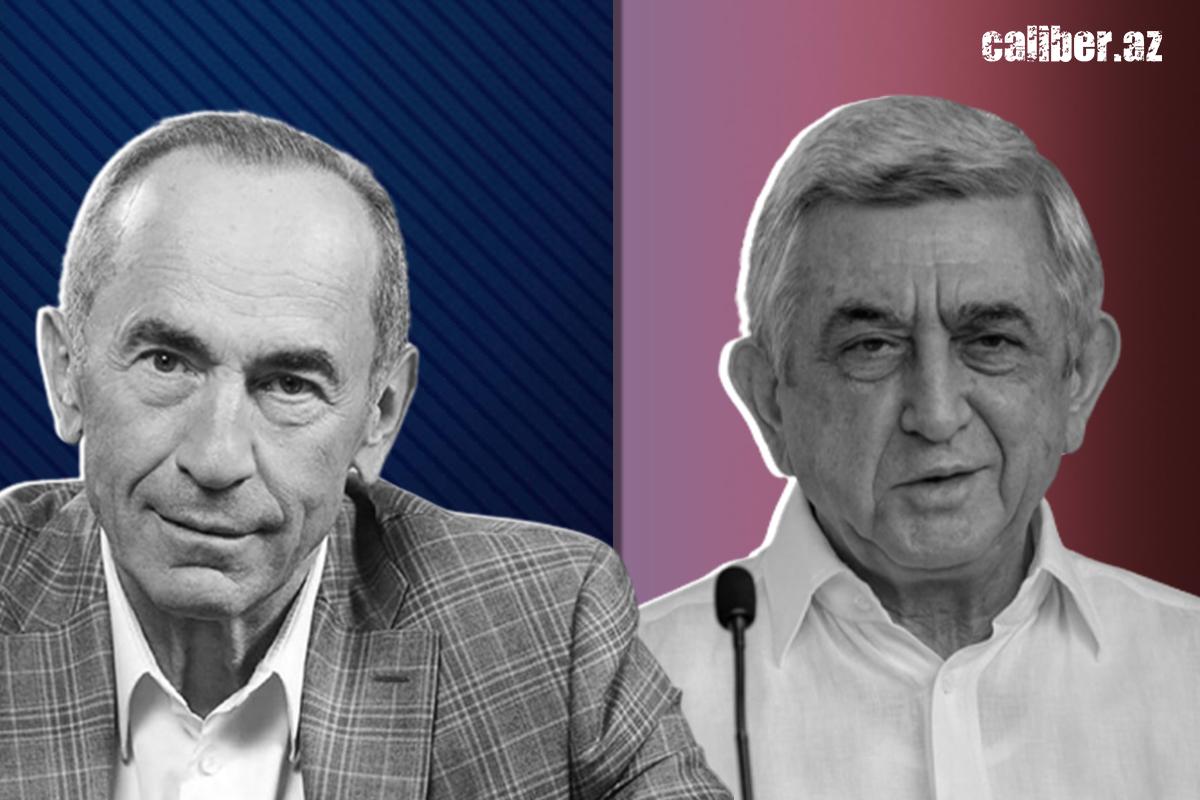Armenia’s enduring racist and fascist ideology From Ter-Petrosyan to Pashinyan
A recently released video exposing the agenda of the "Armenian National Movement" (ANM), led by Levon Ter-Petrosyan, as well as the broader policies of the Armenian state, provides striking evidence of the presence of a deeply misanthropic ideology within Armenian society. This ideology, particularly in its stance toward the Azerbaijani people, is neither concealed nor condemned; rather, it appears to be openly embraced and perpetuated.
Every Armenian president without exception has seemingly endorsed this ideology, as did the communist leadership of the Armenian SSR before them. This continuity was bolstered by the highest ranks of the Soviet Union's party elite, led by Mikhail Gorbachev. Evidence supporting this claim can be found in various sources, including ANM documents, which shed light on the troubling persistence of this mindset.
Thus, according to the publication Armenia: Twenty Months of Struggle, prepared by this organization in 1989, during a rally held in Yerevan on November 4, 1988, one of the leaders of the so-called "Karabakh Committee," Rafael Ghazaryan, openly called for ensuring "emigration" through the use of pre-formed "detachments." Ghazaryan declared: "For the first time in decades, we have been given a unique opportunity to cleanse Armenia of Azerbaijanis. I consider this the greatest achievement of our ten-month struggle."
In this context, prominent Armenian journalist Mark Grigoryan noted: "If one were to believe the rhetoric heard at rallies in Yerevan, Azerbaijanis in Armenia simply 'left.' In reality, during that 'autumn,' the Azerbaijanis living in Armenia did not leave of their own accord. Their departure can only be described as deportation."
In the book Through Seven Borders by Russian traveller and writer Anton Krotov, a resident of Armenia from that period openly admits: "The village of Zod (Basarkechar District – Ed.) was inhabited solely by Azerbaijanis, but they all moved to Azerbaijan, and those who didn’t, we drove them out. Not a single one remains."
Russian researcher Konstantin Voevodsky, who cannot be accused of even the slightest sympathy toward Azerbaijan, testified that "the peak of violence occurred in late November 1988, during which murders of Azerbaijanis were reported." Even the then-chairman of the KGB of the Armenian SSR, Husik Harutyunyan, was forced to acknowledge the killing of peaceful Azerbaijani civilians, though he limited the number of victims to 25.
At that time, Soviet Army officer Pavel Labutin, who also cannot be considered sympathetic to Azerbaijan, confirmed that "atrocities, pogroms, and massacres of the Azerbaijani population took place in Armenia’s Gugark District (Boyuk Garakilsa – Ed.)." He emphasized the "extreme" nature of the violence against Azerbaijanis in Armenia.

Russian historian and publicist Ksenia Myalo, who was in Baku during those days, noted that in November 1988, "a flood of Azerbaijani refugees, driven out by Armenians from several districts of the republic, poured in here." She described harrowing scenes: "A young Azerbaijani woman holding a tiny girl in her arms, with a boy clinging to her skirt. They had walked for three days across a snow-covered pass. An elderly teacher, whose face, in addition to the general shock shared by everyone, bore a particular expression of bitterness—after all, he had taught children about certain principles of life that had collapsed before their very eyes. Azerbaijani villagers from the Armenian settlements of Lermontovo and Fioletovo, where their neighbours were Russian Molokans."
Russian ethnopsychologist Svetlana Lurie, who served as the head of the Interdepartmental Research Center for Ethnopsychology at Yerevan State University and had consistently expressed open support for the Armenian side, was also forced to acknowledge that at the end of 1988, there was a "deportation of Azerbaijanis from Armenia—immediate, almost instantaneous, with nearly everything completed within three days." In describing these events, she used terms such as "organized action" and "direct violence."
The outcome of this lawlessness, effectively carried out with the knowledge of Soviet authorities and the silent support of the "freedom-loving" and "democratic" West, was documented by the United Nations: "As a result of the aggression and ethnic cleansing of Azeris both from the territory of Armenia itself and from the occupied Azerbaijani lands, there are over one million refugees and displaced persons in Azerbaijan today, including people belonging to various minorities." Additionally, the documents state: "As a result of the war…the armed forces of Armenia have occupied and are holding 20 per cent of the total territory of Azerbaijan."
As is clearly evident from Ter-Petrosyan's revelations, the facts mentioned above were the realization of the Armenian state's policies, which remained unchanged over time. In 2003, Armenia's second president, Robert Kocharian, loudly declared during a session of the Parliamentary Assembly of the Council of Europe (PACE) that "Armenians and Azerbaijanis are ethnically incompatible." As a result, the then-Secretary General of the Council of Europe, Walter Schwimmer, expressed regret over Kocharyan's statement, while the PACE president at the time, Peter Schieder, stated that "since its creation the Council of Europe has never heard the phrase 'ethnic incompatibility.'"
However, this openly declared racist-fascist ideology was a derivative of the official line of Yerevan. This can even be seen in certain nuances related to the opening of the Armenian Bone Marrow Donor Registry charity foundation in Yerevan in 2000. As stated by the honorary president of the foundation, the wife of the then-president of Armenia, Bella Kocharyan, "we have a wonderful laboratory for practical work." The foundation's goal was outlined as "unifying the genetic profile qualities of Armenians worldwide, since the Armenian ethnic group, like other ancient ethnicities, has a specific set of DNA."
However, one may ask: Was it truly a "genetic profile," or was it racism? This immediately evokes a comparison with one of the laws passed by the German Reichstag in 1935, the "Law for the Protection of German Blood and German Honor." As stated in the preamble of the document, the reason for the law's creation was the understanding by lawmakers that "the purity of German blood is an essential condition for the continued existence of the German people." The consequences of this law are, of course, well-known to all.
Additionally, Armenia’s third president, Serzh Sargsyan, gained attention for his fascist rhetoric, including his statement: "Before Khojali, the Azerbaijanis thought that they were joking with us, they thought that the Armenians were people who could not raise their hand against the civilian population. We were able to break that [stereotype]. And that’s what happened." In 2010, the Azerbaijani Ministry of Foreign Affairs called on the international community to address the racist nature of Sargsyan's remarks, where he mentioned genetic studies allegedly proving the 8000-year existence of Armenia. As emphasized, "all of this represents claims of national exclusivity compared to other neighbouring peoples, including Azerbaijanis," who were referred to by the Armenian president as a "Turkic-Muslim nomadic tribe."

Thus, even the few facts listed above clearly demonstrate a consistent continuity in Armenia’s leadership in following a fascist-racist paradigm toward the Azerbaijani people. It is highly symptomatic that in response to an invitation from Prime Minister Nikol Pashinyan last month to participate in debates, Ter-Petrosyan stated: "What is there to debate with you when the subject of the debate, Armenian Artsakh, has ceased to exist because of your adventurism?" In doing so, Ter-Petrosyan directly acknowledged that he saw the territories of historically Azerbaijani Karabakh and surrounding Azerbaijani regions as exclusively "Armenian."
In this context, one can also recall Pashinyan's statement that "Karabakh is Armenia, and period!" as well as his orders to subject peaceful Azerbaijani cities to artillery and rocket bombardment.
To conclude the material, I would like to present two quotes from the President of Azerbaijan, Ilham Aliyev. On November 23, 2020, during his visit to the liberated Agdam, the head of state stated: "We have destroyed Kocharyan’s and Sargsyan's army." He continued, "Kocharyan and Sargsyan, you have knelt before us," adding, "I am standing here, in front of the mosque you have destroyed, in the city of Aghdam which you destroyed, I came here with my army. I came here as a winner, while you will live the rest of your pathetic life with a mark of defeat and cowardice."
In 2024, during a meeting with returning residents in Khojaly, President Ilham Aliyev remarked that with the completion of the Khojaly Memorial Complex, "the whole world will see what Armenian barbarism is. This is the truth, and everyone should know it. Armenia itself must recognize this and apologize to us. Only by doing this, the current leadership of Armenia might be able to somewhat cleanse the sins of these savages, vandals, and bloodsuckers. If it does not, then I think Armenia itself will never be able to stand on its feet."
As noted in the commentary by the Western Azerbaijan Community on the video posted on YouTube featuring Ter-Petrosyan’s speech, its existence proves that "Armenia pursued a policy of ethnic cleansing against the Azerbaijani people," adhering to the approach of "No population, no problem." The current Armenian authorities "continue these criminal actions by preventing the return of deported Azerbaijanis."
For Yerevan, it is time to study the lessons of recent regional history, so as not to once again find itself in a military-geopolitical misstep.








